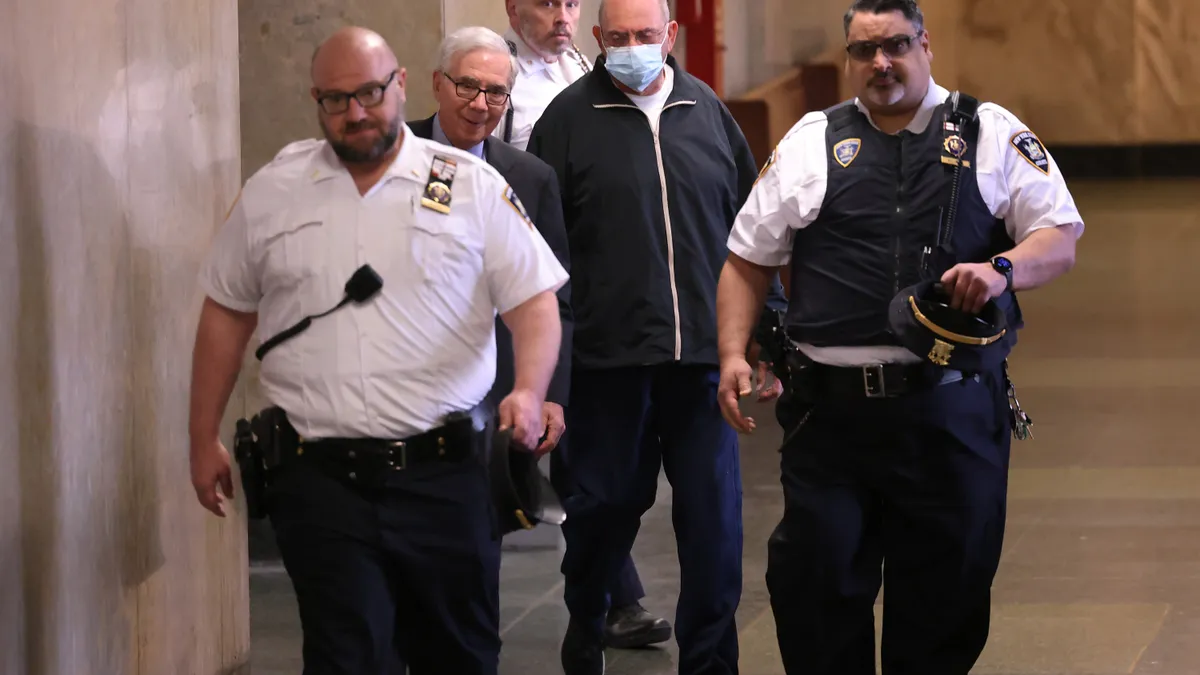Dive Brief:
- New York Supreme Court Justice Juan Merchan floated the possibility Friday of ex-Trump Organization CFO Allen Weisselberg testifying in the ongoing hush money trial against former President Donald Trump, according to reports.
- The judge raised the option of calling the former CFO to see if he would be willing to testify after lawyers for the former president objected to prosecutors’ plans to show the jury a copy of Weisselberg’s severance agreement, according to reports by Politico. “What we are trying to do is to explain from our perspective why he’s not here,” Assistant DA Christopher Conway said when arguing in favor of showing the document.
- However, counsel for Trump objected, with defense attorney Emil Bove noting there were a number of issues preventing the ex-CFO from appearing. Weisselberg is currently serving a five-month prison term after pleading guilty to charges of felony perjury relating to Trump’s real estate case in New York, where the ex-CFO was also a named defendant.
Dive Insight:
Neither side has attempted to compel Weisselberg’s appearance in court, attorneys said when asked by Merchan. The justice indicated he would need to further consider the situation before ruling on whether or not to subpoena Weisselberg for testimony.
The issue of how Weisselberg’s severance agreement could come into play in the Manhattan District Attorney’s case — which alleges the former president committed financial and electoral crimes in connection with a hush money payment to porn star Stormy Daniels — is a complex one, attorneys told CFO Dive.
“Generally, non-disparagement agreements do not apply to testimony compelled by subpoena, particularly in criminal cases,” Michael Bachner, a partner at Bachner & Associates, told CFO Dive in an emailed response to questions. Bachner is not involved in the case.
Such agreements are “generally not enforceable against public policy and could be considered as obstruction of justice,” Bachner, a former assistant DA for the New York County District Attorney’s Office said.
Weisselberg may lose the remainder of his severance upon testimony, defense attorneys for the ex-president argued in court last year. The terms of the ex-CFO’s agreement and where they stand are already murky, having drawn scrutiny during New York Attorney General Letitia James’ civil fraud case against Trump several months prior, CFO Dive previously reported.
The $2 million agreement includes language barring the ex-CFO from disparaging his former employer or the Trump Organization, with Weisselberg set to receive the funds in $250,000 installments over the course of two years. The timing of the severance payments caused Andrew Amer, a prosecutor in the NY Attorney General’s office, to question Trump’s son Eric Trump — who testified he had drafted the agreement — about whether Weisselberg was being paid not to disparage the company or his father, a line of questioning echoed by prosecutor Conway when the agreement was brought up during the hush money trial.
Defense attorney Bove objected that the “complicated situation” surrounding the ex-CFO would be “completely unexplained” by the document and argued there would be procedural issues adding Weisselberg to the witness list currently, according to reports. Eric Trump testified during the civil fraud case that the disparagement language in the agreement was standard.
Further complicating matters, Judge Arthur Engoron, who presided over the civil fraud case, ruled that Weisselberg was required to pay back any ill-gotten gains he had received as part of his severance from the Trump Organization, among other penalties.
It’s unclear whether Weisselberg will be called upon to testify, but his testimony could have unforeseen effects on the course of the trial. On Trump’s part, the former president may want the ex-finance chief to testify in order to “establish that he was always concerned about his reputation and the money to Daniels was no different than a non-disparagement clause,” Peter Tilem, senior partner at Tilem & Associates told CFO Dive via email in response to questions. Tilem is not involved in the case.
Rather than his severance agreement, the “bigger issue” of Weisselberg testifying is “the concern that his testimony may be simply unknown,” Bachner said. “No one wants to risk calling a witness with surprises.” Finally, Weisselberg may have Fifth Amendment concerns which make him unavailable to testify, he said.
Seth Rosenberg, an attorney for Weisselberg with Clayman, Rosenberg, Kirshner & Linder, did not immediately respond to requests for comment.













